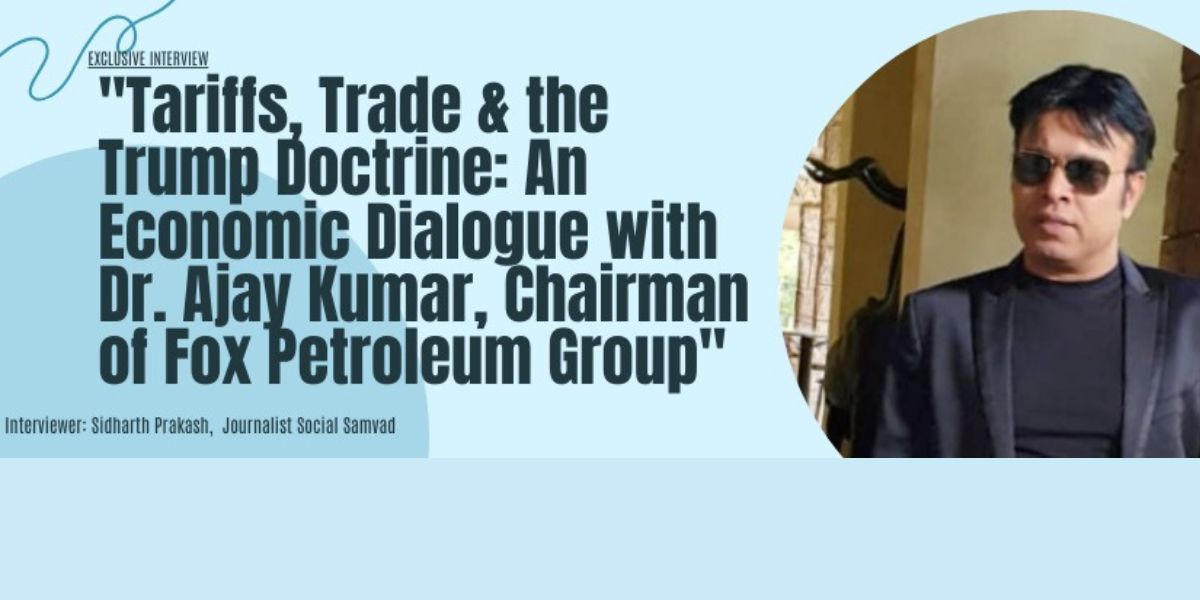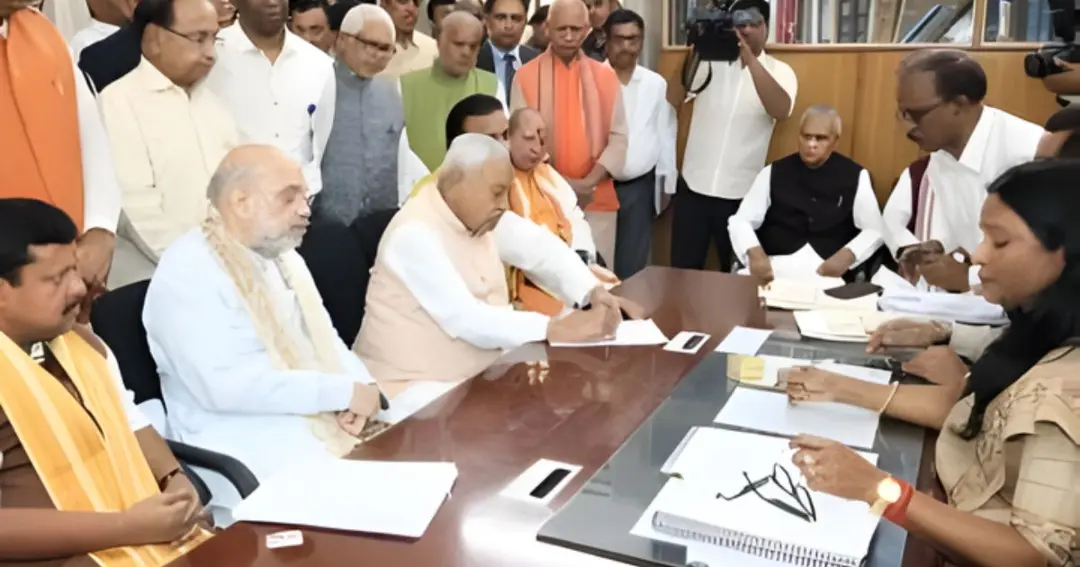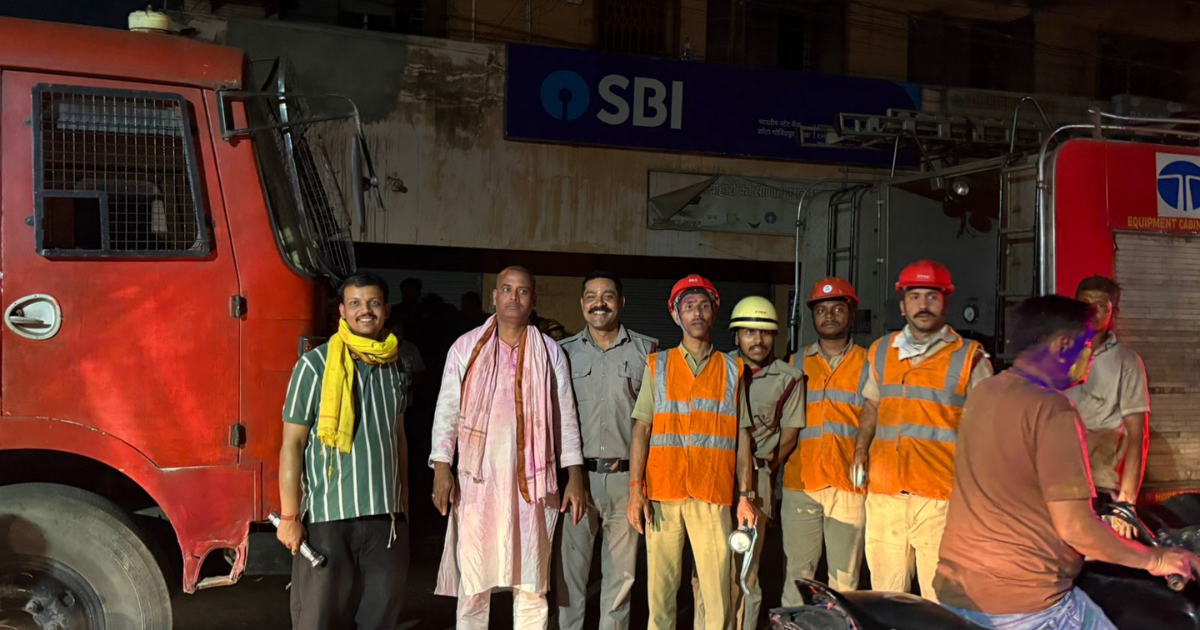Social Samvad / Desk / (Sidharth Prakash) : Today just wanted to know how : “Tariffs, Trade & the Trump Doctrine will help America. I have listed some questions for him with the help of some economist.
Main Segment: Trump’s Tariffs – Boon or Burden?

Interviewer (Sidharth Prakash): Good afternoon, Dr. Ajay Kumar. It’s always a pleasure to have your insights, especially given your extensive experience in global trade, energy, and infrastructure—from your years in the U.S. business environment to leading transformative ventures through the Fox Petroleum Group. As someone who understands both the American and international business psyche, your perspective today is incredibly valuable.
Having said that my first question to you Dr. Kumar, President Trump’s proposed tariffs—10% on all imports, and as high as 54% on Chinese goods—have drawn intense debate. From your global business perspective, do you see these tariffs benefiting the American economy?
Dr. Ajay Kumar :
Absolutely, Sidharth—if implemented thoughtfully. The essence of these tariffs is to level the playing field. By making imports more expensive, the policy encourages U.S. companies to bring manufacturing back home. This “reshoring” effect, especially in sectors like steel, automobiles, and precision machinery, could reignite industrial heartlands in states like Ohio, Pennsylvania, and Michigan. If American-made products become more cost-competitive, it not only means job creation but also a revival of domestic supply chains—something we’ve desperately needed post-COVID.
Sidharth Prakash:
And what about the trade deficit? The U.S. ran over a $1 trillion goods deficit in 2023. Can tariffs realistically narrow that gap?
Dr. Ajay Kumar:
Yes, provided the ecosystem adjusts. Tariffs discourage overreliance on imports. They nudge consumers and businesses toward “Made in USA” goods. If domestic industries scale up in response, and purchasing habits align, the deficit could decline. More importantly, it strengthens the dollar in the long term, and brings sustainability to America’s trade books. But execution is key—industries need clarity, consistency, and incentives to invest locally.
Sidharth Prakash:
Let’s talk revenue. The Tax Foundation estimates these tariffs could generate $2.9 trillion over a decade. Do you see this as a practical source of federal funding?
Dr. Ajay Kumar:
Undoubtedly. Tariffs are, in effect, a revenue tool. If the estimated $100 billion from auto-related tariffs, for instance, is used wisely—be it tax relief for workers, infrastructure revamps, or energy innovation—it can uplift entire communities. I particularly appreciate Trump’s vision of “no tax on tips” and incentives for American energy independence. The tariffs could fund those without burdening the average taxpayer.
Sidharth Prakash:
You’ve always emphasized energy security and national resilience. How do tariffs play into America’s national security, especially against rivals like China?
Dr. Ajay Kumar:
That’s a critical point. National security today isn’t just military—it’s economic. When we depend on nations like China for essentials—pharmaceuticals, semiconductors, rare earths—we expose ourselves to risk. Tariffs, if paired with smart exemptions and domestic capacity-building, can insulate America from such vulnerabilities. We’ve seen it in oil & gas too—American shale revolution happened because policy aligned with opportunity. It’s time for semiconductors and strategic industries to follow suit.
Sidharth Prakash:
What about global negotiations? Are these tariffs a blunt weapon, or a strategic tool?
Dr. Ajay Kumar:
They’re both, Sidharth. Tariffs can sound aggressive, but they’re really negotiation levers. When you threaten 54% tariffs on Chinese goods or 25% on Japanese autos, it forces the other side to come to the table. That opens doors for U.S. farmers, energy exporters, and tech companies to access fairer terms. Think of it as economic diplomacy, not economic warfare.
On the Ground: Real-Life Impacts
Sidharth Prakash:
Let’s make this real. How might the average American feel these tariffs? Could you give us some examples?
Dr. Ajay Kumar:
Of course. A steelworker in Pittsburgh might finally see their plant hiring again. A family in Detroit might prefer an American-made vehicle, now more affordable compared to a tariffed Japanese import. A small manufacturing firm in North Carolina may expand its labor force, gaining an edge over imported alternatives. Even retirees in Florida could benefit—if tariff revenue is directed to eliminate taxes on Social Security or fund public healthcare. These are tangible, everyday impacts.
Caveats and Trade-offs
Sidharth Prakash:
Some economists warn about price hikes and retaliation. The Yale Budget Lab estimates a 2.3% price rise for consumers. Your thoughts?
Dr. Ajay Kumar:
Yes, we must be honest—there are trade-offs. Higher import costs could pinch consumers, particularly on electronics or foreign-made essentials. Retaliation from trading partners may hit exporters—soybean farmers in Illinois or energy firms in Texas. GDP might take a short-term dip. But that’s where policy coherence matters. If we pair tariffs with incentives for domestic manufacturing, ease of doing business, and innovation grants, we can offset the short-term pinch with long-term gain.
Final Take
Sidharth Prakash:
Dr. Kumar, in one sentence—are Trump’s tariffs a net positive or negative for the American economy?
Dr. Ajay Kumar:
They’re a strategic reset—a necessary correction to decades of imbalanced trade—and if executed with vision and discipline, they can spark a renaissance in American industry, self-reliance, and economic pride.
Sidharth Prakash:
Brilliantly put. Thank you, Dr. Ajay Kumar, for your insights. Your global perspective rooted in American experience adds much-needed clarity to this complex issue.
Dr. Ajay Kumar:
Thank you, Sidharth. Always a pleasure to discuss solutions that matter.










